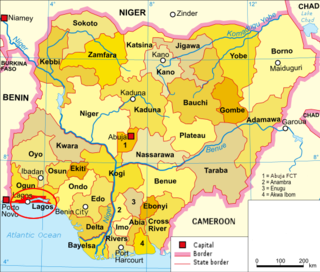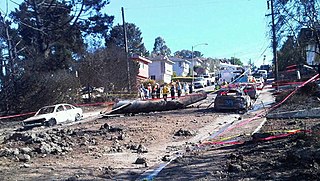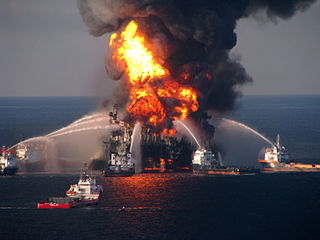Investigation
| | This section needs expansion. You can help by adding to it. (September 2011) |
The president, Olusegun Obasanjo, ordered a full police investigation. [3] [ citation needed ]
The 2006 Atlas Creek pipeline explosion was a disaster that occurred on 12 May 2006 at Atlas Creek Island (sometimes called Isanki Island), near Lagos, Nigeria, when a pressurized petrol pipeline that had been ruptured by thieves exploded, killing 150 people. [1] The Nigerian Red Cross said that vandals had originally drilled holes into the pipe to steal fuel, and that local people had then come down with jerrycans to fill them with fuel. [1] Approximately five hundred jerrycans were found at the scene of the explosion, which incinerated anyone within a 20-metre radius. [2] Many victims were buried nearby in a mass grave. [3]
| | This section needs expansion. You can help by adding to it. (September 2011) |
The president, Olusegun Obasanjo, ordered a full police investigation. [3] [ citation needed ]
A gas explosion is an explosion resulting from mixing a gas, typically from a gas leak, with air in the presence of an ignition source. In household accidents, the principal explosive gases are those used for heating or cooking purposes such as natural gas, methane, propane, butane. In industrial explosions many other gases, like hydrogen, as well as evaporated (gaseous) gasoline /petrol or ethanol play an important role. Industrial gas explosions can be prevented with the use of intrinsic safety barriers to prevent ignition.

Gasoline theft occurs when gasoline is stolen from a gas station, pipeline or vehicle.

The Buncefield fire was a major fire at an oil storage facility on that started on 11 December 2005 at the Hertfordshire Oil Storage Terminal, located near the M1 motorway, Hemel Hempstead, in Hertfordshire, England. The terminal was the fifth largest oil-products storage depot in the United Kingdom, with a capacity of about 60 million Imperial gallons of fuel. The terminal is owned by TOTAL UK Limited (60%) and Texaco (40%).

The Movement for the Emancipation of the Niger Delta (MEND) is one of the largest militant groups in the Niger Delta region of Nigeria.

The 2006 Abule Egba pipeline explosion is a disaster that occurred in the heavily populated neighborhood of Abule Egba in Lagos, Nigeria, on 26 December 2006, killing hundreds of people. There were originally believed to be around 500 deaths, but it was later confirmed that the loss was smaller.

On 15 May 2008 a pipeline explosion occurred in the community of Ijegun, a suburb north of Lagos, Nigeria. The explosion took place after a bulldozer struck an oil pipeline. The Lagos police have stated that the explosion appears to be an accident, and not the work of thieves, as in past pipeline explosions near Lagos. Construction workers accidentally broke an underground pipeline from which fuel started to spill out; moments later an explosion occurred.
On October 18, 1998, a pipeline explosion occurred in the community of Jesse, 290 kilometres (180 mi) southeast of Lagos, Nigeria. The cause of the blast has been debated. The Nigerian government stated the explosion took place after scavengers intentionally ruptured the pipeline with their tools and ignited the blaze; however, others have stated the pipeline ruptured due to a lack of maintenance and neglect with a cigarette igniting the fire. With 1,082 deaths attributed to the blast, the 1998 Jesse explosion has the distinction of being the most deadly pipeline explosion to have occurred in Nigeria.

The catastrophe of Sange was the explosion of a tank truck on 2 July 2010 in South Kivu, in the Democratic Republic of the Congo. The truck overturned in the village of Sange and later exploded, resulting in at least 230 deaths and 196 injured.

The San Bruno pipeline explosion occurred at 6:11 pm PDT on September 9, 2010, in San Bruno, California, when a 30-inch (76 cm) diameter steel natural gas pipeline owned by Pacific Gas & Electric exploded into flames in the Crestmoor residential neighborhood 2 miles (3.2 km) west of San Francisco International Airport near Skyline Boulevard and San Bruno Avenue. The loud roar and shaking led some residents of the area, first responders, and news media to initially believe that it was an earthquake or that a large airplane had crashed. It took crews nearly an hour to determine it was a gas pipeline explosion. As of September 29, 2010, the death toll was eight people. The United States Geological Survey registered the explosion and resulting shock wave as a magnitude 1.1 earthquake. Eyewitnesses reported the initial blast "shot a fireball more than 1,000 feet (300 m) in the air".

Energy resources bring with them great social and economic promise, providing financial growth for communities and energy services for local economies. However, the infrastructure which delivers energy services can break down in an energy accident, sometimes causing considerable damage. Energy fatalities can occur, and with many systems deaths will happen often, even when the systems are working as intended.

On 11 July 2011, at Evangelos Florakis Naval Base, situated at Mari, Larnaca in Cyprus, a large amount of ammunition and military explosives self-detonated, killing 13 people, including the Commander of the Cyprus Navy, Andreas Ioannides, the base commander, Lambros Lambrou, and six firefighters. A further 62 people were injured. The explosion was the worst peacetime military accident ever recorded in Cyprus, with a yield of approximately 481 tons TNT equivalent, as determined by the official investigation into the accident. It was the largest artificial non-nuclear explosion of the 21st century until the 2020 Beirut explosions.
On 18 January 2019, a pipeline transporting gasoline exploded in the town of Tlahuelilpan, in the Mexican state of Hidalgo. The blast killed at least 137 people and injured dozens more. Mexican authorities blamed fuel thieves, who had illegally tapped the pipeline. The explosion was particularly deadly because large crowds of people had gathered at the scene to steal fuel. Security forces tried to persuade people to move away from the scene, but they were outnumbered and asked not to engage with civilians for fear of causing a violent confrontation. The leak was reported at 17:04 CST (11:04 UTC), and the explosion occurred two hours later at 19:10. It took about four hours for responders to extinguish the fire.
On 10 August 2019, a fuel tanker exploded in Morogoro, Tanzania, killing over 100 people and injuring at least 47 others. It was one of the largest disasters of its kind in Tanzania.